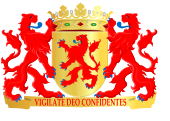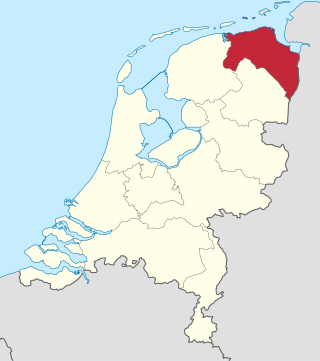
Groningen is the northeasternmost province of the Netherlands. It borders on Friesland to the west, Drenthe to the south, the German state of Lower Saxony to the east, and the Wadden Sea to the north. As of January 2023, Groningen had a population of about 596,000, and a total area of 2,955 km2 (1,141 sq mi).

There are twelve provinces of the Netherlands representing the administrative layer between the national government and the local governments, with responsibility for matters of subnational or regional importance.

The Senate is the upper house of the States General, the legislature of the Netherlands. Its 75 members are elected on lists by the members of the twelve States-Provincial and four electoral colleges for the Senate every four years, within three months of the provincial elections. All provinces and colleges have different electoral weight depending on their population.
The Provincial Council of Friesland is the provincial council for the Dutch province of Friesland, first introduced under the Constitution of the Netherlands in 1814. It forms the legislative body of the province. Its 43 seats are distributed every four years in provincial elections.

The provincial council, also known as the States-Provincial, is the provincial parliament and legislative assembly in each of the provinces of the Netherlands. It is elected for each province simultaneously once every four years and has the responsibility for matters of sub-national or regional importance. The number of seats in a provincial council is proportional to its population.
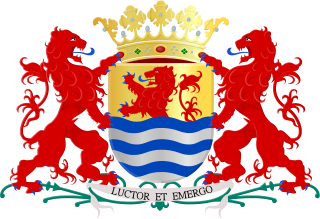
The Provincial Council of Zeeland, also known as the States of Zeeland, is the provincial council of Zeeland, Netherlands. It forms the legislative body of the province. Its 39 seats are distributed every four years in provincial elections.

The Provincial Council of Drenthe, also known as the States of Drenthe, is the provincial council of Drenthe, Netherlands. It forms the legislative body of the province. The Provincial Council currently holds 41 seats, which are distributed every four years in provincial elections. Due to the population of Drenthe having grown larger than 500.000 in September of 2022, the amount of seats in the Provincial Council of Drenthe is set to be expanded from 41 to 43 after the 2023 provincial elections.

The Provincial Council of Groningen, also known as the States of Groningen, is the provincial council of Groningen, Netherlands. It forms the legislative body of the province. Its 43 seats are distributed every four years in provincial elections.
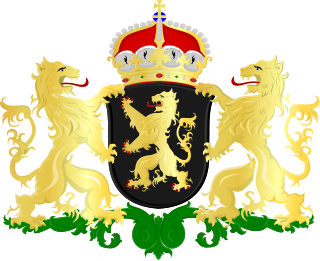
The Provincial Council of North Brabant, also known as the States of North Brabant, is the provincial council of North Brabant, Netherlands. It forms the legislative body of the province. Its 55 seats are distributed every four years in provincial elections.
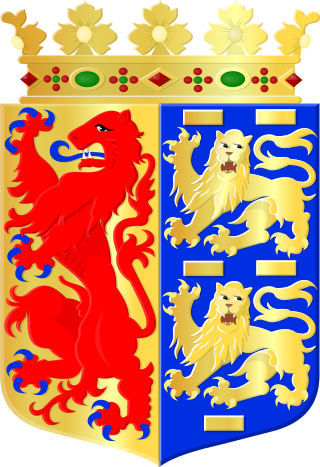
The Provincial Council of North Holland, also known as the States of North Holland, is the provincial council of North Holland, Netherlands. It forms the legislative body of the province. Its 55 seats are distributed every four years in provincial elections.

The 2019 election to the Senate of the Netherlands was held on 27 May 2019, two months after the provincial elections.

Provincial elections were held in the Netherlands on 20 March 2019. Eligible voters elected the members of the Provincial States in the twelve provinces of the Netherlands. The elections were held on the same day as the 2019 Dutch water boards elections and, in the Caribbean Netherlands, island council elections.

Christiaan Anton Jansen is a Dutch politician for the right-wing populist Party for Freedom (PVV). He has been serving as State Secretary for Public Transport and the Environment since July 2024, and he previously was a member of the House of Representatives between November 2019 and March 2021.

J.H. "Henk" de Vree is a Dutch politician, who served on the House of Representatives in the period 2020–21 and from 2023 onwards. There, he represents the right-wing populist Party for Freedom (PVV).

Simone Kerseboom is a Dutch politician of the conservative populist party Forum for Democracy (FvD). She has been a member of the House of Representatives since the 2021 general election, and she served on the States of Limburg in the years 2019–2023. Kerseboom lived in South Africa for about twenty years and holds a doctorate from Rhodes University.

Gideon Frederik Cornelis van Meijeren is a Dutch civil servant and politician, who has been representing Forum for Democracy (FVD) in the House of Representatives since the 2021 general election. He also held a seat in the States of South Holland and was elected to the municipal council of The Hague in 2022. He previously worked as a legislative adviser for the government. His opposition to the government's policy to mitigate the COVID-19 pandemic and his statements regarding democracy – including speculation about an overthrow of the government – have drawn stark criticism from political leaders. In June 2024, Van Meijeren was sentenced to 200 hours of community service for incitement to violence for his utterances in past speeches and interviews.
Michiel P. Hoogeveen is a Dutch politician of the right-wing conservative JA21 party. He started his career in the financial sector and as a freelance North Korea researcher. He became a member of Forum for Democracy (FVD) in 2016 and was elected to the States of South Holland three years later. He left the party in 2020 and subsequently joined JA21, which he represented in the European Parliament as part of the European Conservatives and Reformists (ECR) between April 2021 and July 2024.

Provincial elections were held in the Netherlands on 15 March 2023, on the same day as the water board elections, as well as island council elections in the Caribbean Netherlands.

Groninger Interest is regionalist political party which is active in the province of Groningen, the Netherlands.

Strong Local Drenthe is a regionalist political party in the Netherlands, a partnership of various local political parties in the province of Drenthe. The party is represented in the Provincial Council in that province and is a member of Independent Politics Netherlands.
